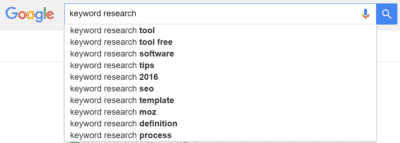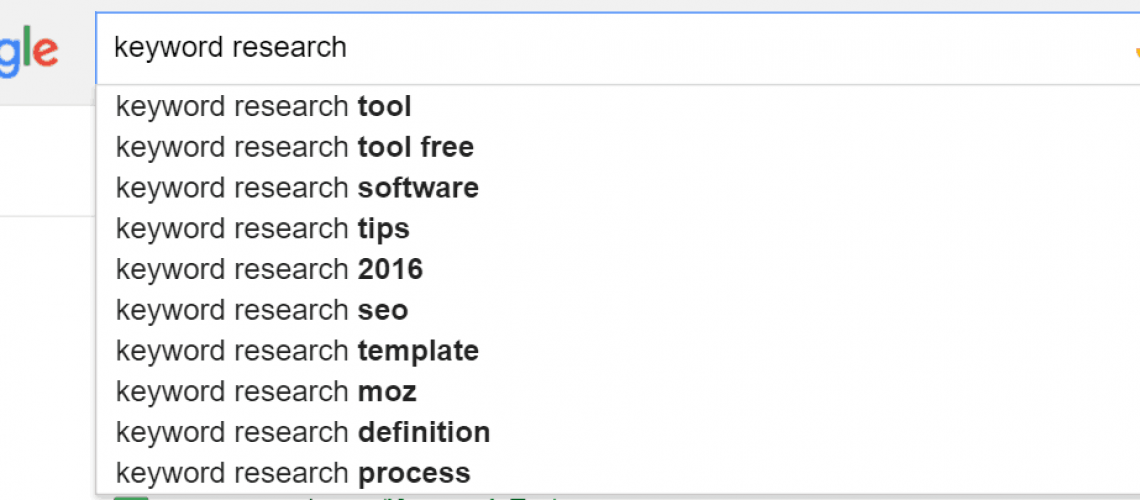Unless you count basic awareness of search engines keyword research is the first step in SEO. Before you can optimize your pages for search you need to know what people are searching for. Keyword research can be simple or complex. Starting with simplest keyword research:
Google Search Page – This is the most basic of all but there is a wealth of information by looking at the type of search result page that gets served, if there is a local pack or knowledge graph or shopping feature. Read the title tags and see what the competition is targeting. Check the suggested searches at the bottom of the page.
Google Trends – Very simple very basic, not very accurate, but a good place to start looking for and comparing keywords. And you can get these neat little dashboards for your keywords, related keywords, geographic search distribution, and rising searches.
Trends will show you how news stories track in search and whatever else people are interested in. Today it’s Pokemon Go, and probably will be for the foreseeable future, it was Brexit a few weeks ago and another fad on the way. Trends can also email you alerts for tracked keywords.
Suggested Searches – Google autocomplete will suggest what you want based on popularity. Using this post as an example, here are the suggested searches for “keyword research“:

This is good for really basic ideas for targeting. Google suggests searches based on previous searches by other users and people generally use what Google suggest, it is why they are there in the first place.
The more specific the question, the more specific the answer. As you can see from the list the longer the search string the more specific the search is. Some of them are for a particular brand, another is for a definition, but each gets more specific with the length. You want to pick keywords that closely match your offers, products, and services.
Wired did a great series on Google Autocomplete with some celebrities answering questions suggested by Google Autocomplete. Not to get too far ahead but the entire idea is to generate content that people are looking for.
You can do this even if you aren’t a celebrity. Your offerings, products, and services need to be crafted into content that fits someone’s search intent. Start with a question about your product or a common sales objection. Or just add “what is” in front of your product, or “scam” afterwards and see if that gives you any ideas for content that could overcome an objection and rank well in search.
If you want to see the mega-list of suggested keywords go to Ubersuggest and get the full list of suggested keywords from Google’s API. 248 suggested keywords that you can download as csv to upload into more advanced keyword research tools.
Google AdWords – Another example of getting water from the same well. AdWords API is what a lot of the paid search tools use and it is free to use their keyword planner to get a list of keywords volume and cost per click, a crude measurement of perception of value. The higher the cost per click, the more the traffic is valued by your competition. One of the best reasons to run AdWords is to gain access to more keyword data. Sure you have to pay for it, but you also get the traffic and can use the data to bolster your organic search targets also. Because (not set) and (not provided) aren’t really keywords.
Google Webmaster Tools – Google Analytics will track behavior, but it doesn’t tell you your search keywords beyond (not set). Google Webmaster Tools will tell you how many impressions you get in organic search. The keywords that you are already showing up for are often the best. Some of your pages might just need a little extra push to get into the top results where more than half of the clicks go.
Picking keywords isn’t always all about the quantity of search, it is also about taking on a reasonable target. Picking existing search impressions is a good idea because you are already starting to rank for them. High volume of impressions is a high search volume, generally speaking, achievable rankings and larger amounts of traffic are what make a good keyword target.
Sometimes selecting keywords can be really easy, “plumber+your town,” isn’t really that variable, unless you need an emergency plumber. There just isn’t much else that that people search for. Other times you need to select a niche that is would be easy to rank in search and that is also highly actionable, in other words, you are looking for a business opportunity that can drive a lot of sales.
We will go over some paid keyword tools next week.
If you have other questions about SEO, sign up for our email newsletter and get access to our SEO Checklist. Or sign up for one of our Local SEO Packages.





One Response
Great post Kyle! You might want to try Buzzsumo for keyword research 🙂 it works great!